
San Francisco’s aptly named Division Street, which dead ends in the city’s famous tech development district, serves as a metaphor for the disparity between the wealthy few and the expendable many, both in the U.S.A and the wider world. The project is a story of lives lived on hard streets, amidst staggering wealth and empty promises, told through photographs, interviews, newspaper headlines, overhead street conversations, found text and first-person narratives, a long way from the beautiful ‘city by the bay’ conjured up in the popular imagination.
“Be careful who you pretend to be, you might forget who you are.”
“We should Believe in ordinary Acts of Bravery, in the Courage that drives One Person To Stand Up For ANOTHER!”
– Freeway column messages
Division and Bryant, 6 August 2017
Homelessness and community on
Division Street
ROBERT GUMPERT
DEWI LEWIS PUBLISHING
“It’s your business when your neighbor’s wall is in flames.”
“The more corrupt the state, the more numerous its laws.”
“Ask any Mexican, any Puerto Rican, any black man, any poor person – ask the wretched how they fare in the halls of justice, and then you will know, not whether or not the country is just, but whether or not it has any love for justice.”

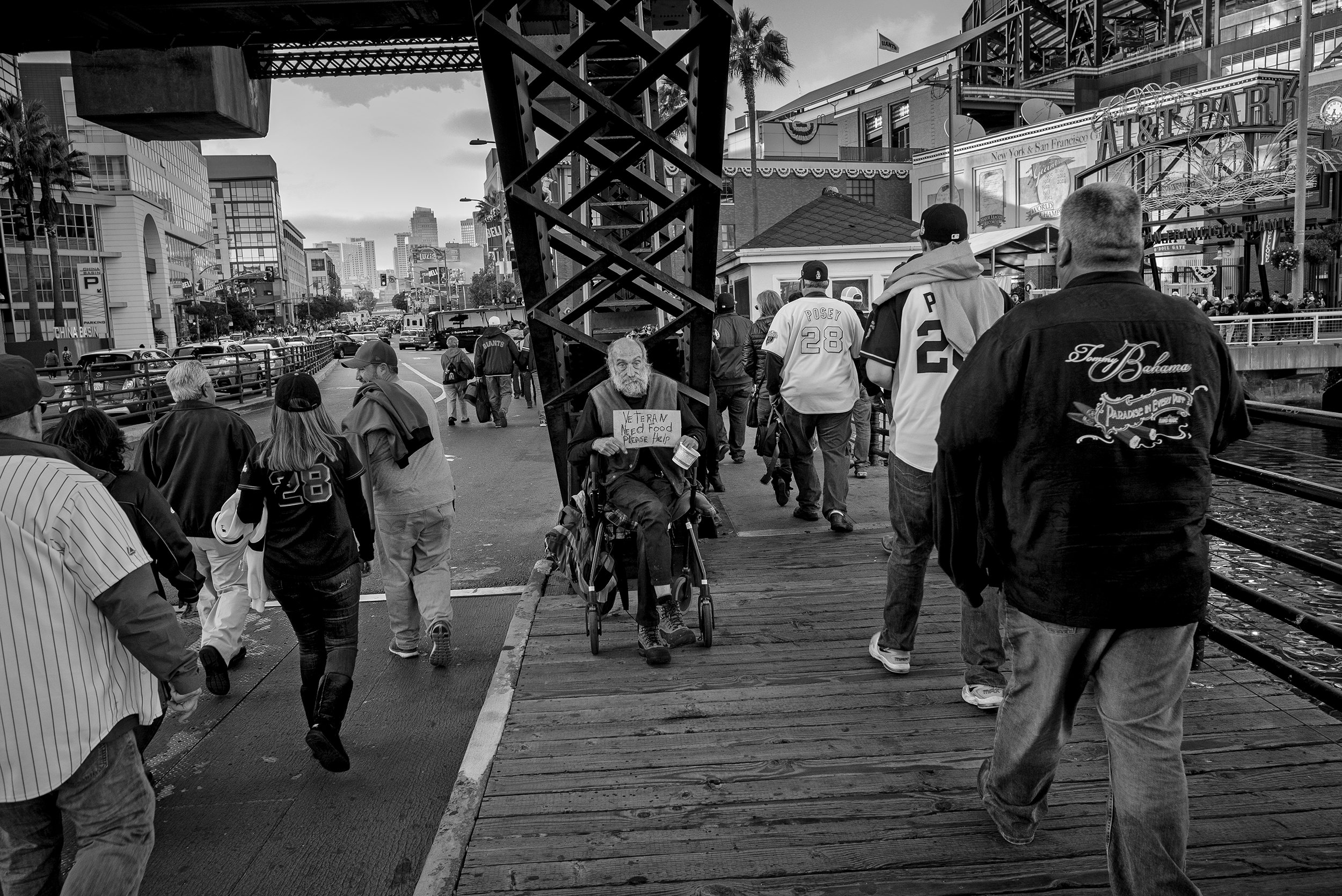
San Francisco Giants baseball fans cross the “Lefty O’Doul Bridge” on way to the ballpark. 10 October 2016.

Cardboard and wooden lattice house, 16th Street near Potrero, San Francisco. 7 August 2016.

Construction of a 27-story, 250 feet residential tower and commercial space building at Otis and 12th Street, San Francisco. 22 January 2020.

New condos at Spear and Folsom. Costs: just under $900,000 for a “junior one-bedroom” to more than $3 million for a three-bedroom, upper-floor unit. 5 October 2019.
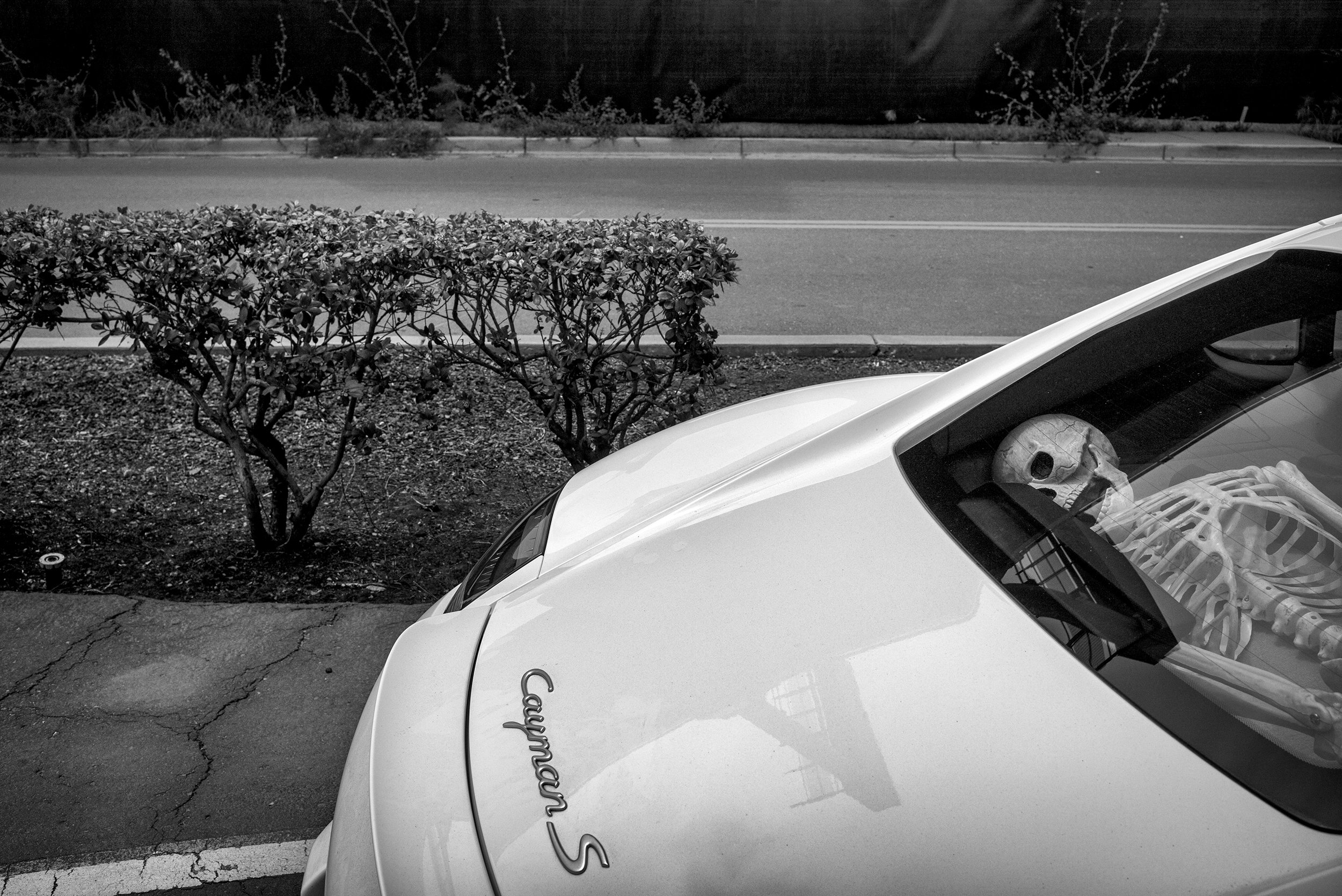
Staff parking lot UCSF Orthopedics building, San Francisco, CA. 25 May 2016.

Tent encampment, Division (13th Street) at Harrison. 16 February 2016, San Francisco.
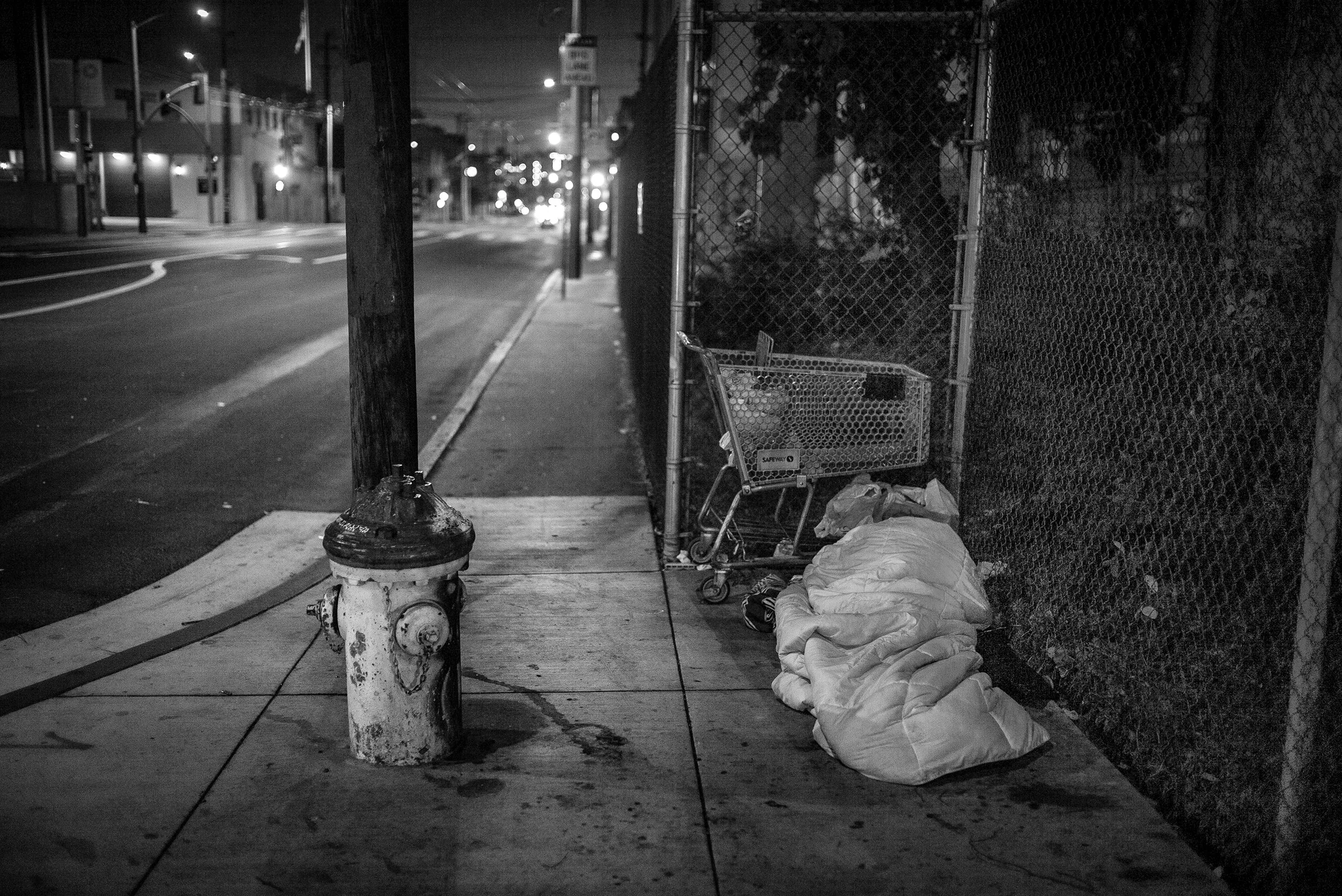
Sleeping rough, 16th and Utah. 9 November 2020, San Francisco.
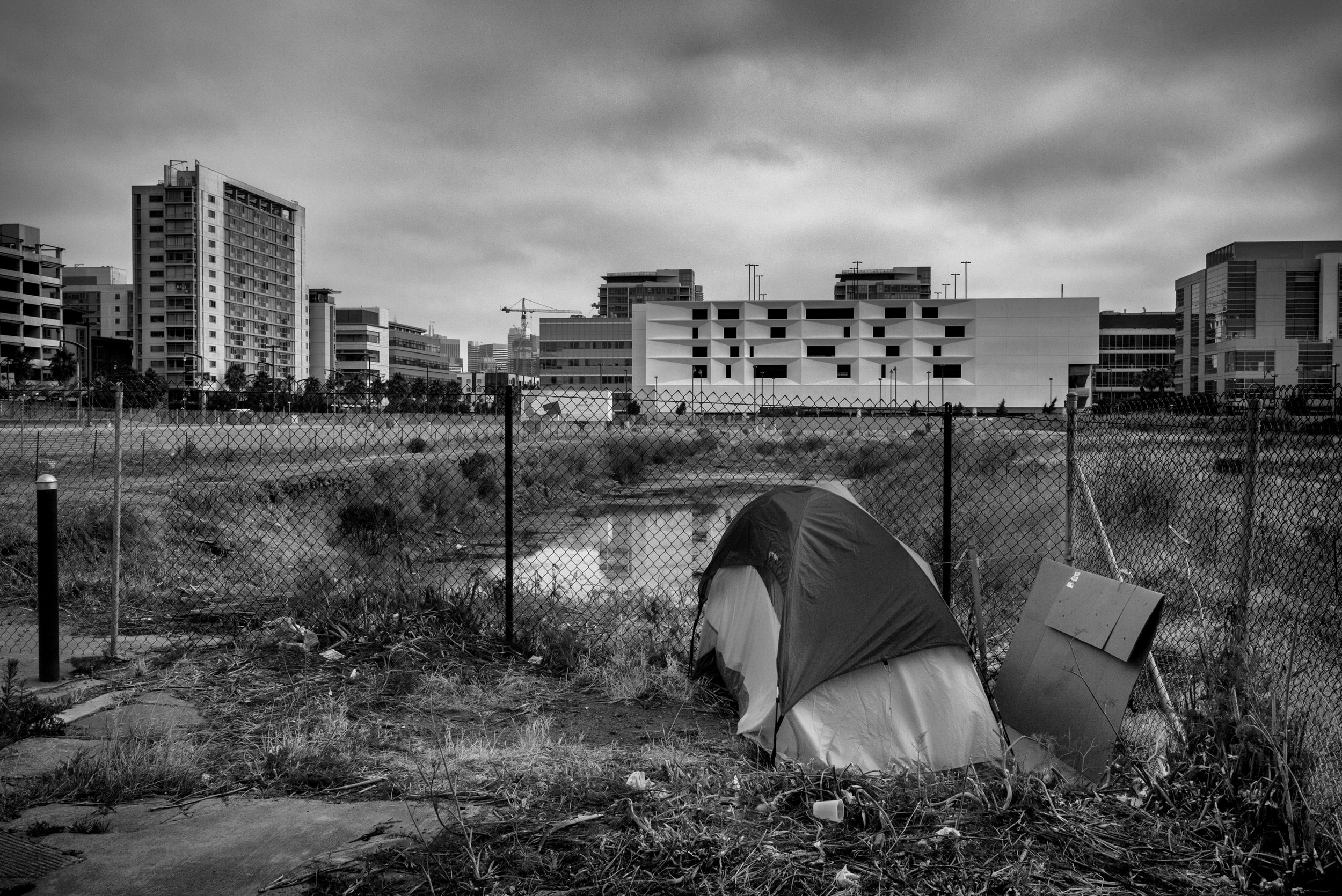
16th and Illinois, Site of SF Warrior’s basketball coliseum. 3 July 2016.

16th and Illinois, Site of SF Warrior’s basketball coliseum. 27 May 2017.
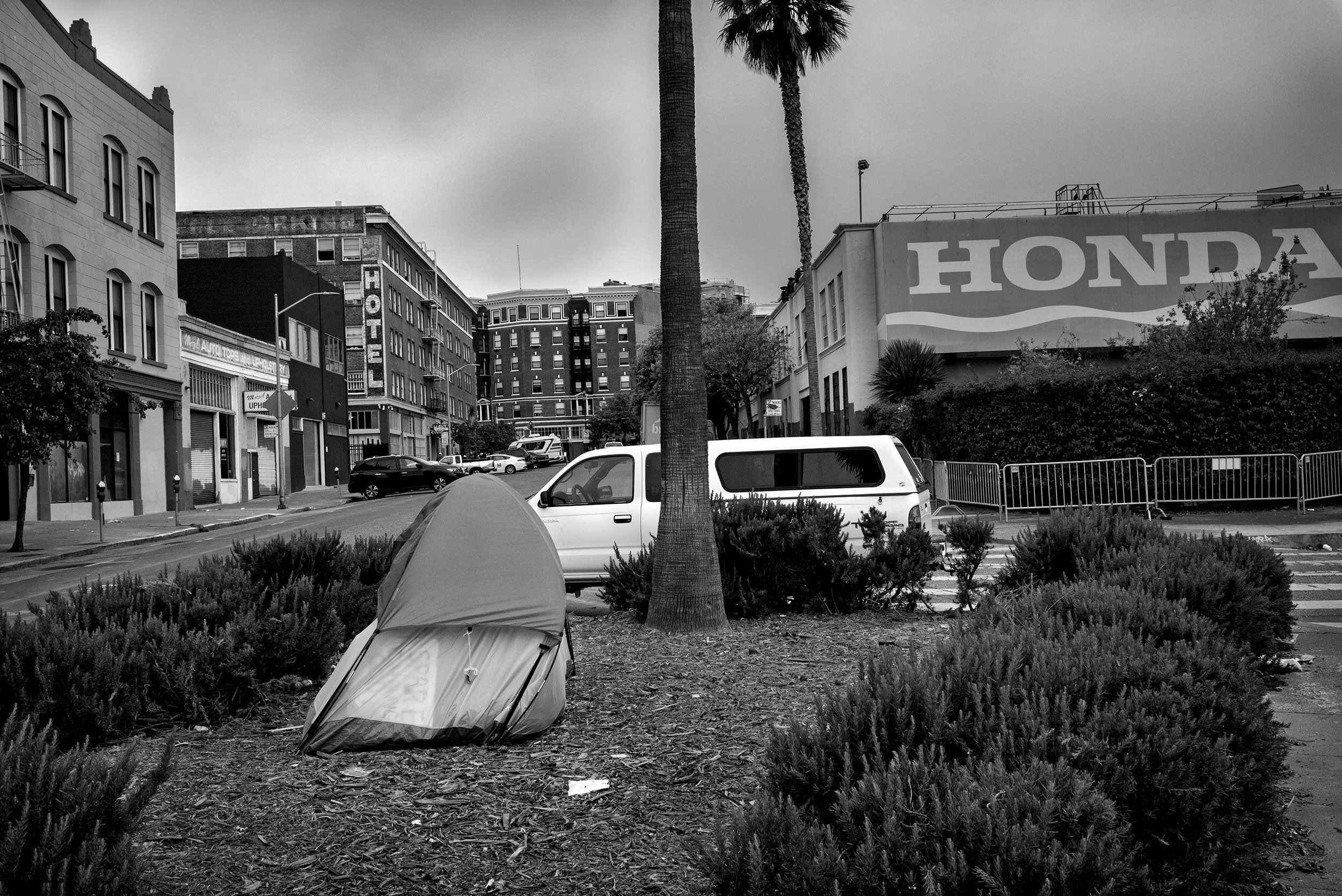
Corner of 12th, South Van Ness and Mission Streets. 18 July 2018.

Corner of 12th, South Van Ness and Mission Streets. 27 May 2019.
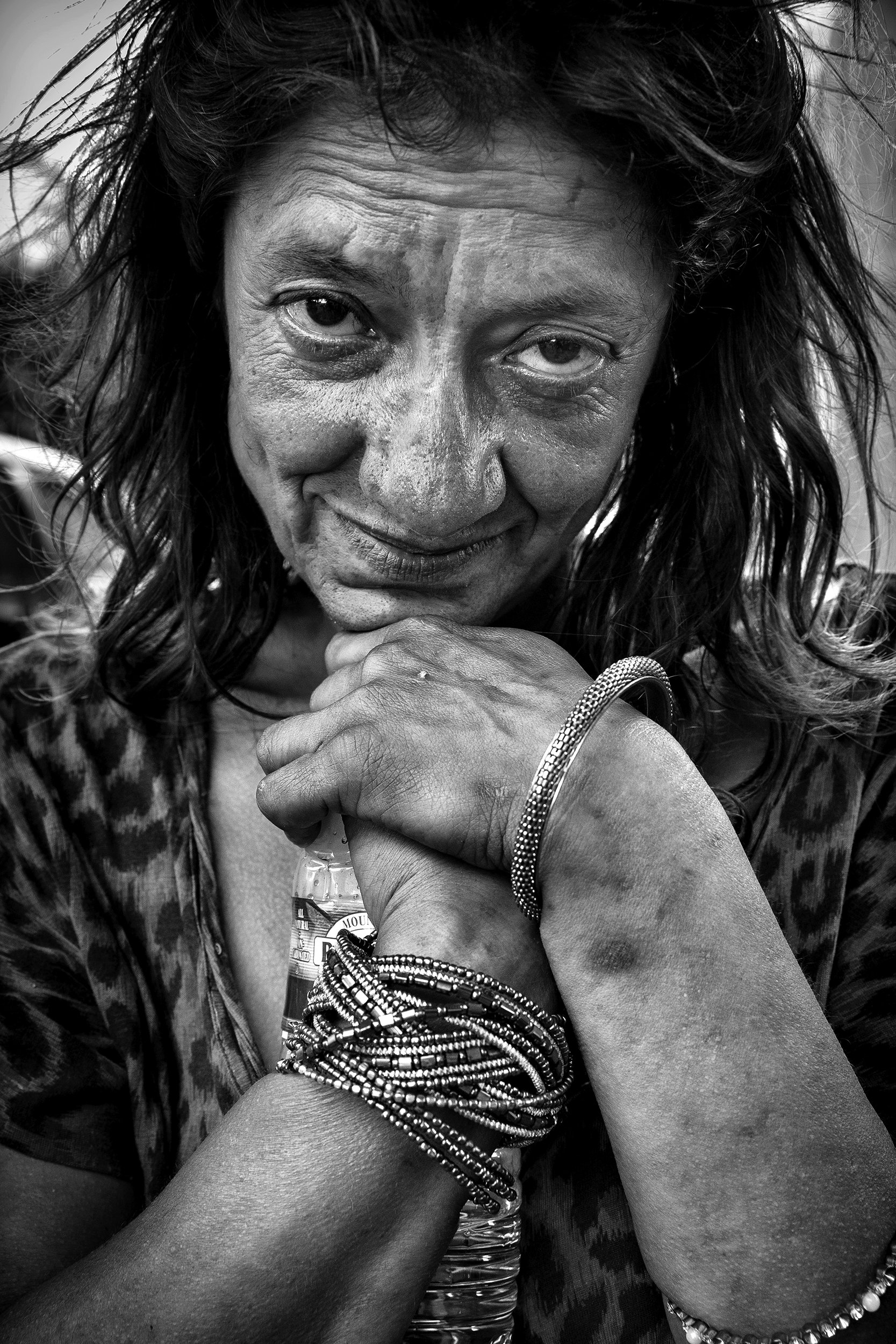
Helia Silva, once from Boston. Brannon Street near 8th. 25 June 2015.

Destiny Vargas at her tent 13th Street and S. Van Ness. 21 February 2016.

Kasper Greene, 39 years old, homeless for about 1.5 years with Grace Roberts, 28 years old, homeless for about a year, in their tent on Florida at Division. 13 September 2016.

Andrew D’Amore, center and anonymous visit Curtis Smith, left, at Curtis’s box home, Indiana, and Caesar Chavez. 4 May 2017.

Tent on Rincon and I80 eastbound. 15 June 2010.

A Division Street and San Bruno encampment. 14 February 2016.
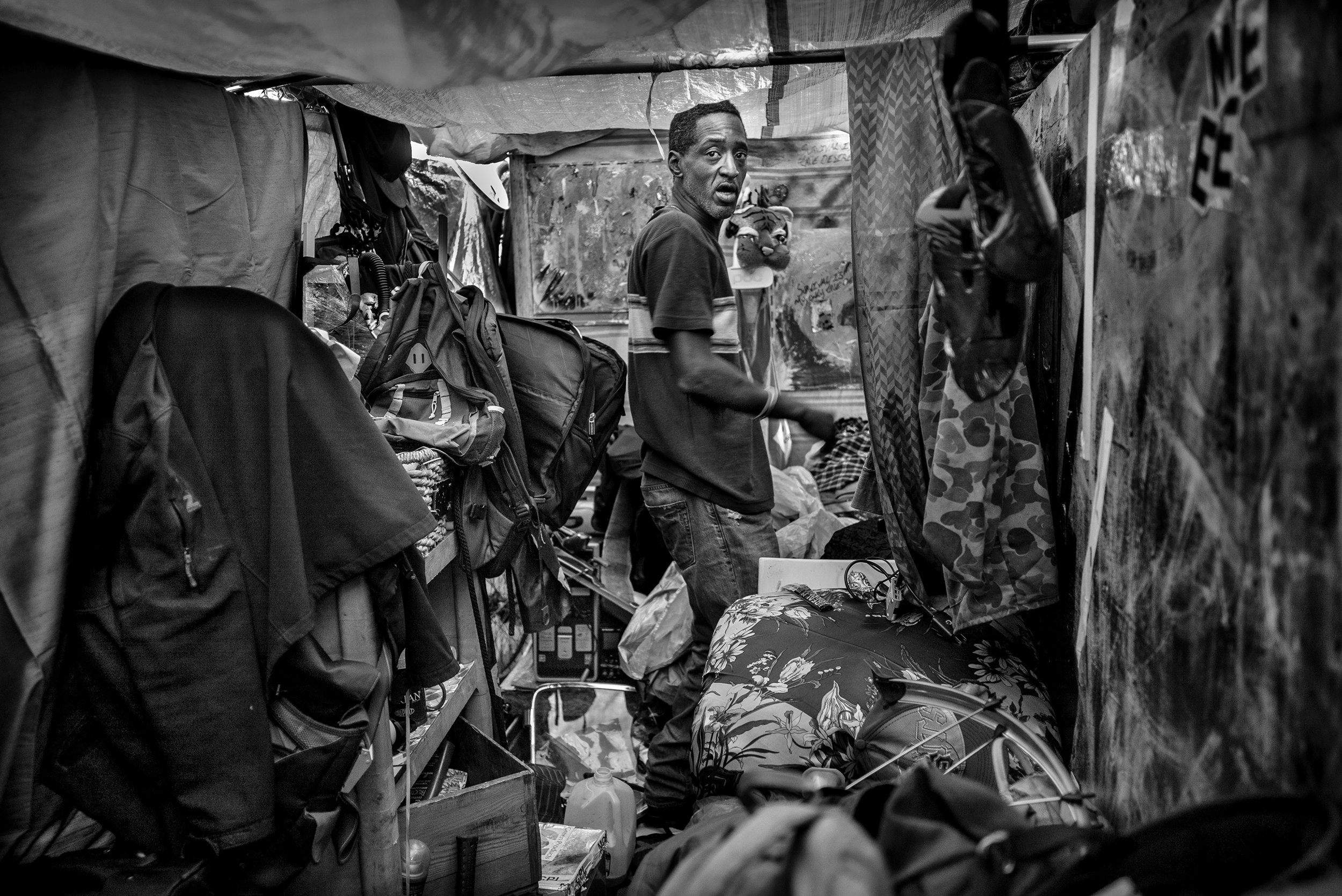
Corey Trosclair at a Division Street and San Bruno encampment 16 February 2016.

Sleeping rough on Polk at Hays, one block from City Hall. 20 February 2017.

Sleeping rough on the earthquake footing of the freeway support at San Bruno and Division. 15 January 2018.
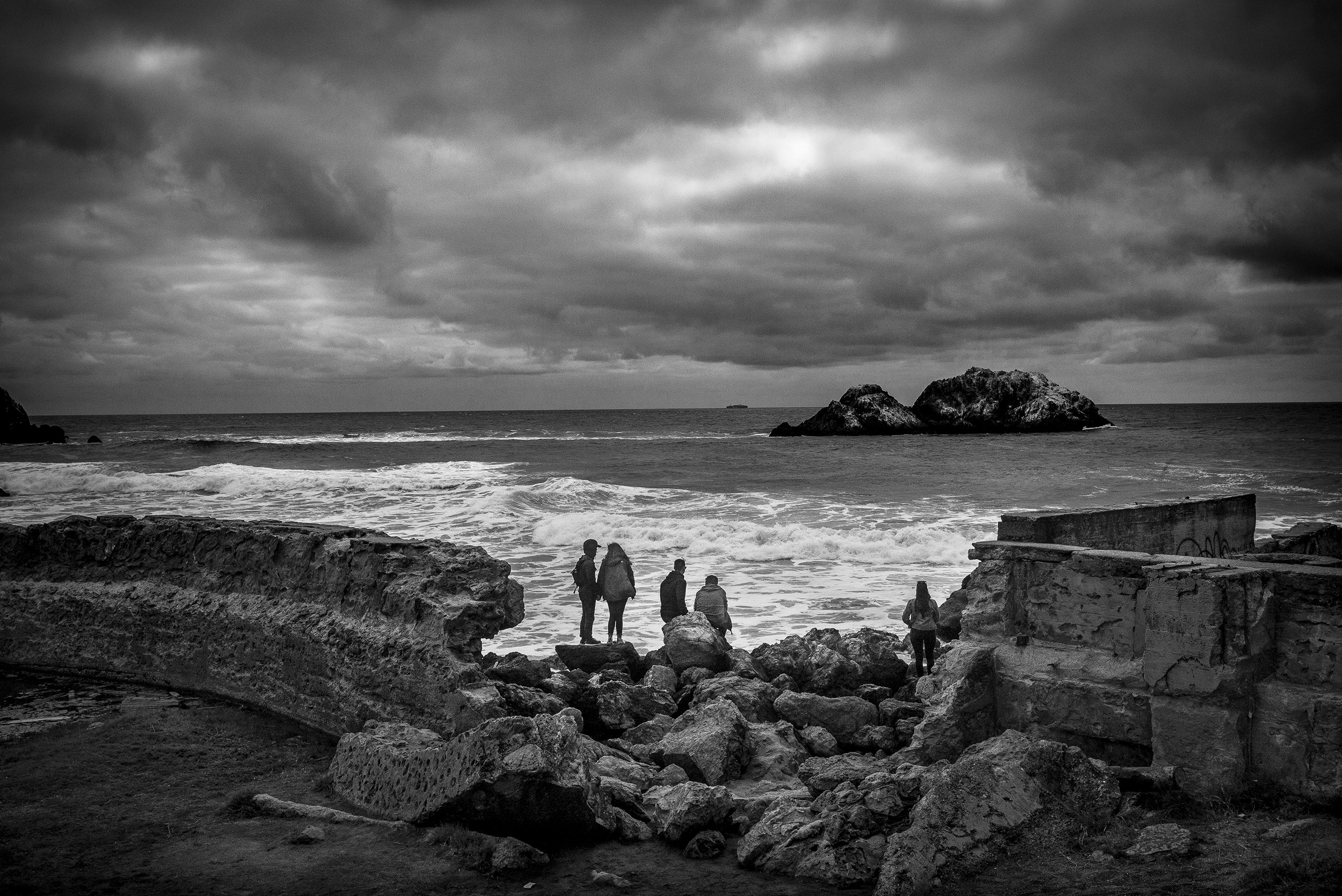
Watching the surf roll in at Sutro Baths. 5 May 2019.

An encampment at San Bruno and Division. 23 September 2019.

U.S. Navy Blue Angeles fly over downtown San Francisco during “Fleet Week”. 10 October 2019.
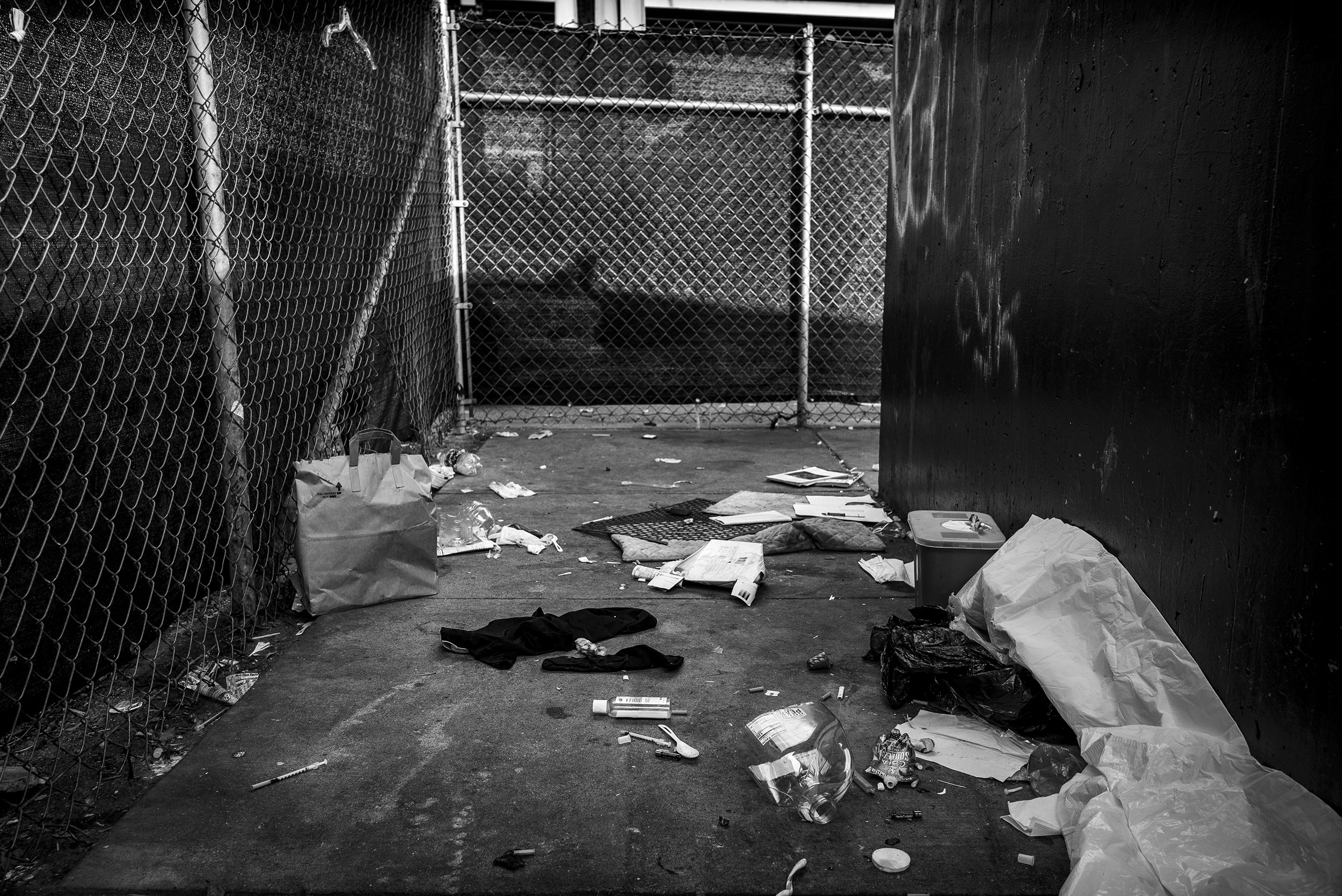
After a city “resolution” sweep of a Division Street and San Bruno encampment. 13 November 2019.

After a city “resolution” sweep of an encampment, Division Street and San Bruno. 13 November 2019.

Running along the “Great Highway”, at the beach. The highway was closed to vehicles during the pandemic. 10 October 2020.

A Division Street and San Bruno encampment during the pandemic. 14 November 2020.

Dead crow, 7th Street near the corner with Brannan. 5 September 2015.

Two buses for the early morning commute, a San Francisco city bus carrying mostly service workers either home or to their jobs and a chartered “google bus” taking tech workers to their jobs at the tech firms in the south bay. 14 September 2017.

A small encampment on Pennsylvania and 22nd Streets, opposite the Food Bank. 19 April 2021.

San Bruno Avenue between 15th and Alameda Streets in SOMA, an area often used by the unhoused to encamp. And just as often “swept” by the city. 06 June 2021.
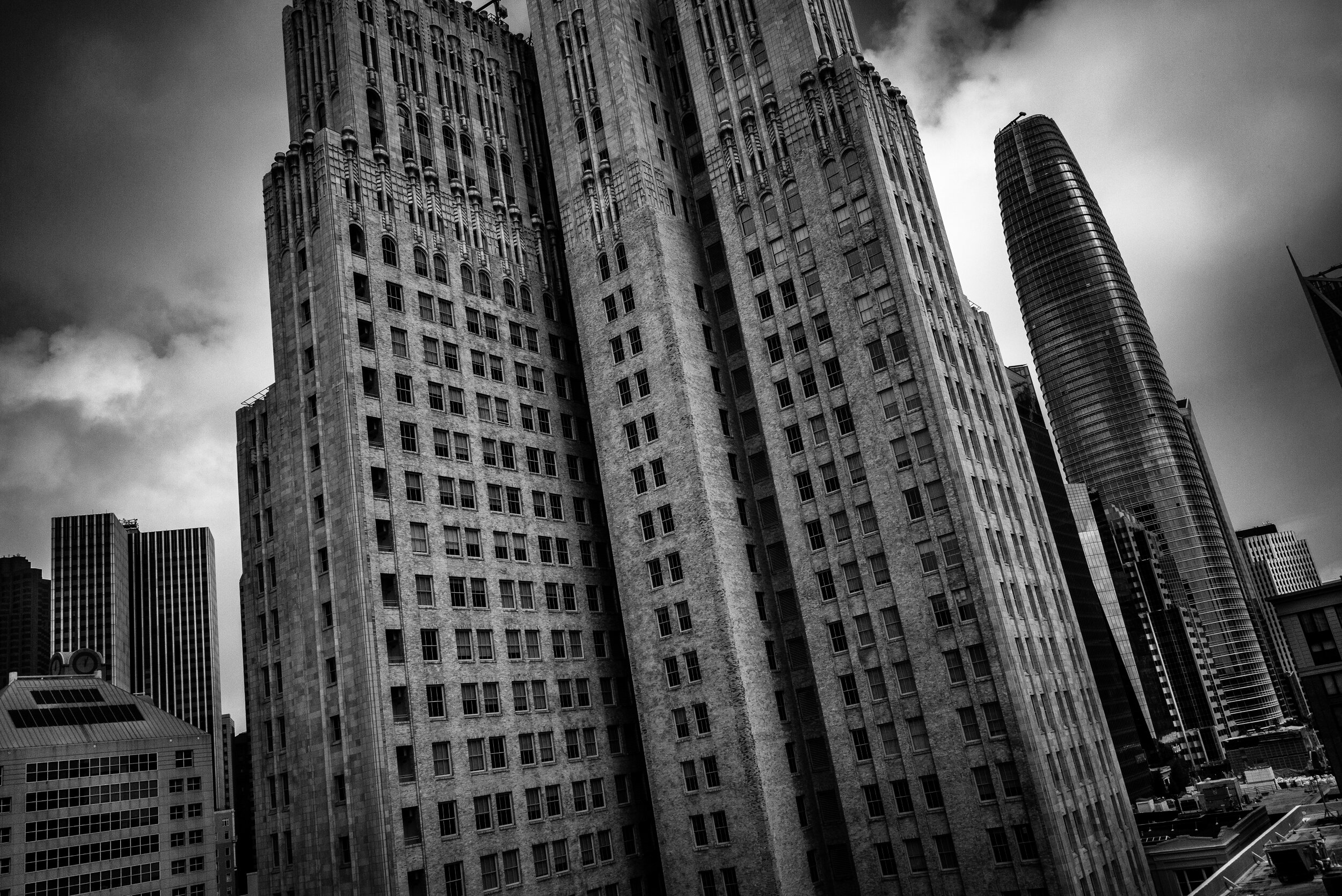
In the foreground, the old Pacific Telephone building, then YELP’s San Francisco headquarters and now tech office space for lease. In the back, the new Salesforce building behind. 7 April 2019.
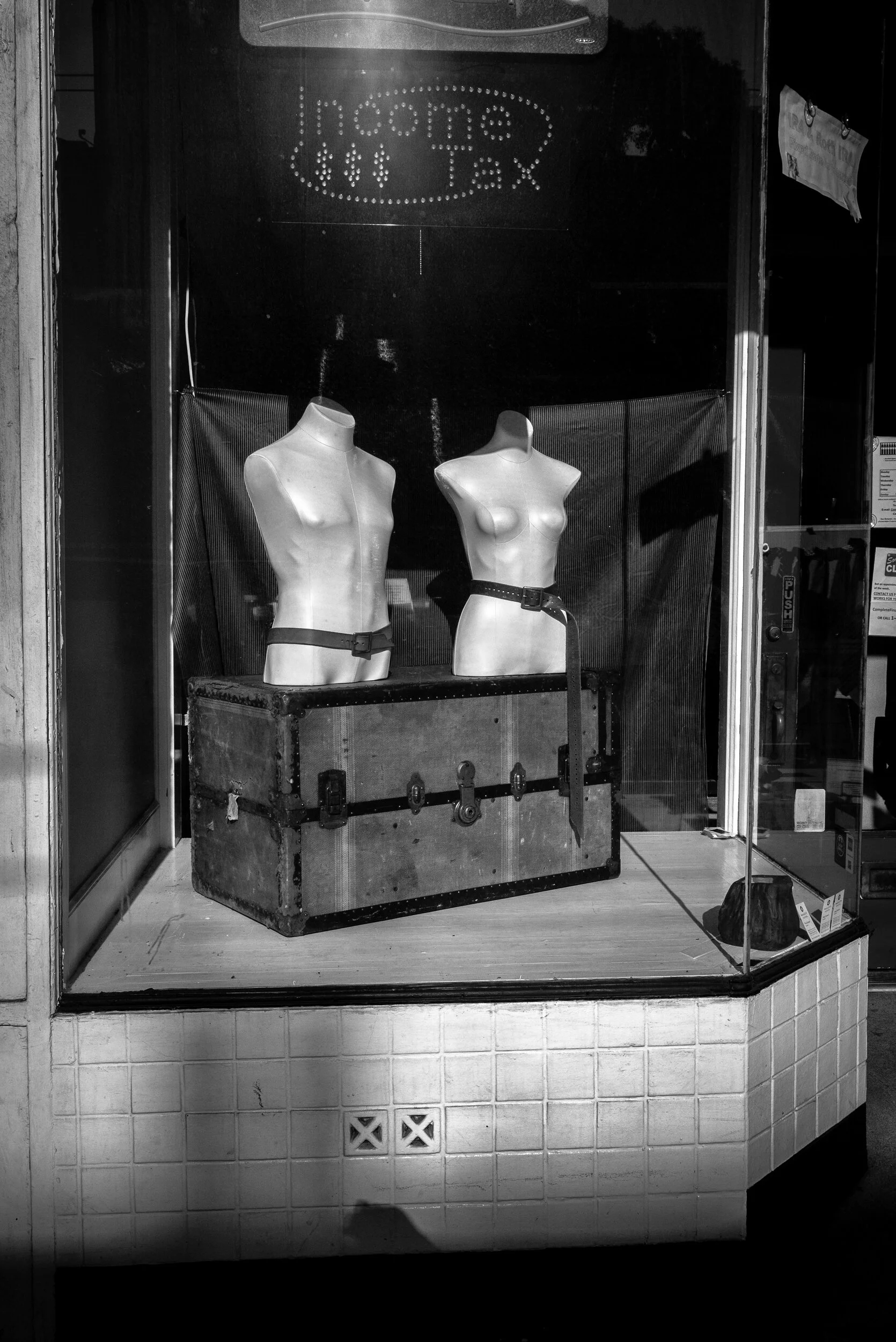
Storefront window on Divisadaro near Bush. 29 Jan 2019, San Francisco, CA

SFO International Arrivals waiting area. Drivers waiting for their customer. 8 March 2019.

Lincoln Park Public Golf Course overlooking the Golden Gate. 3 Sept 2019, San Francisco, CA
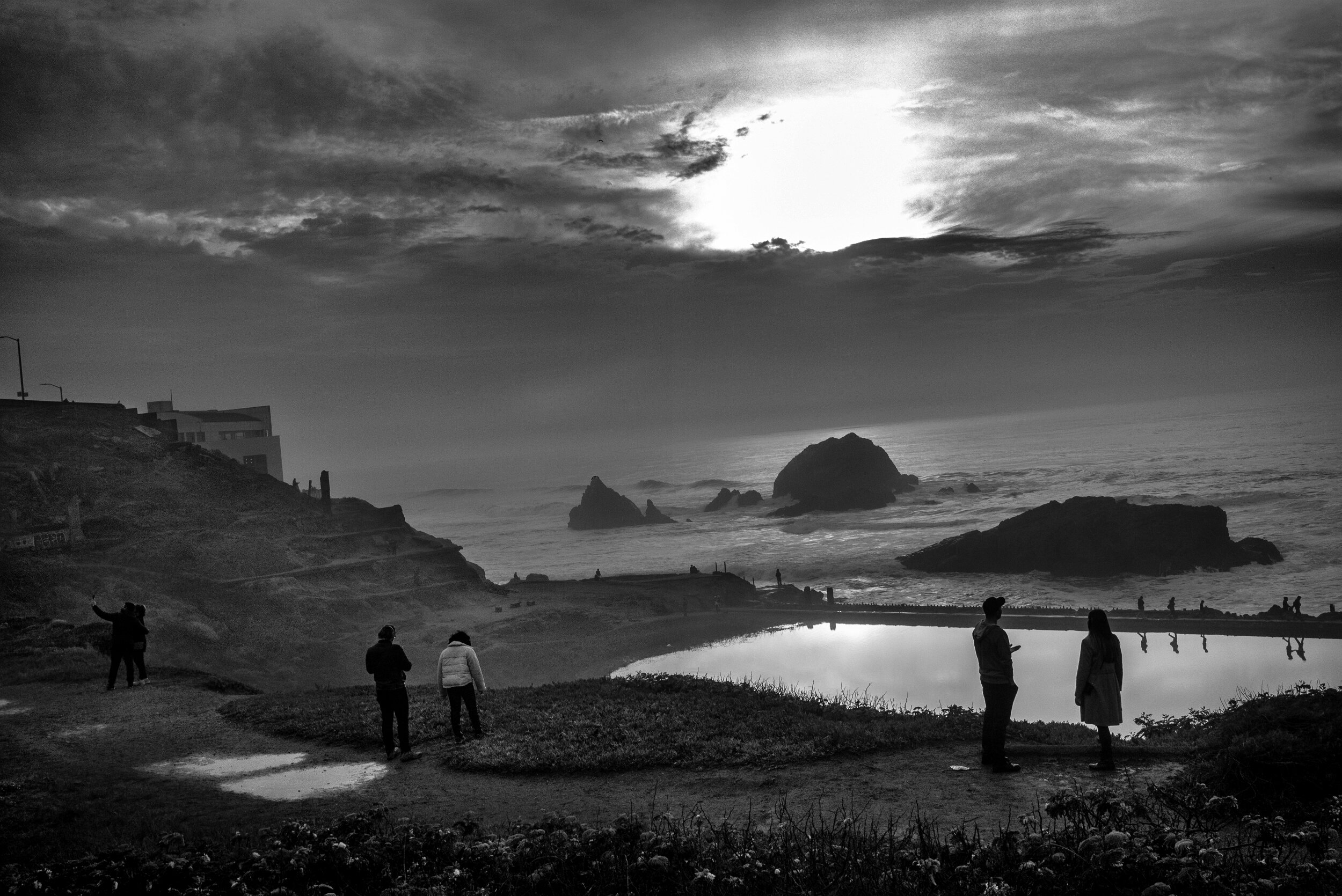
Overlooking the Pacific outside the Golden Gate from above Sutro Baths. 3 January 2021, San Francisco.
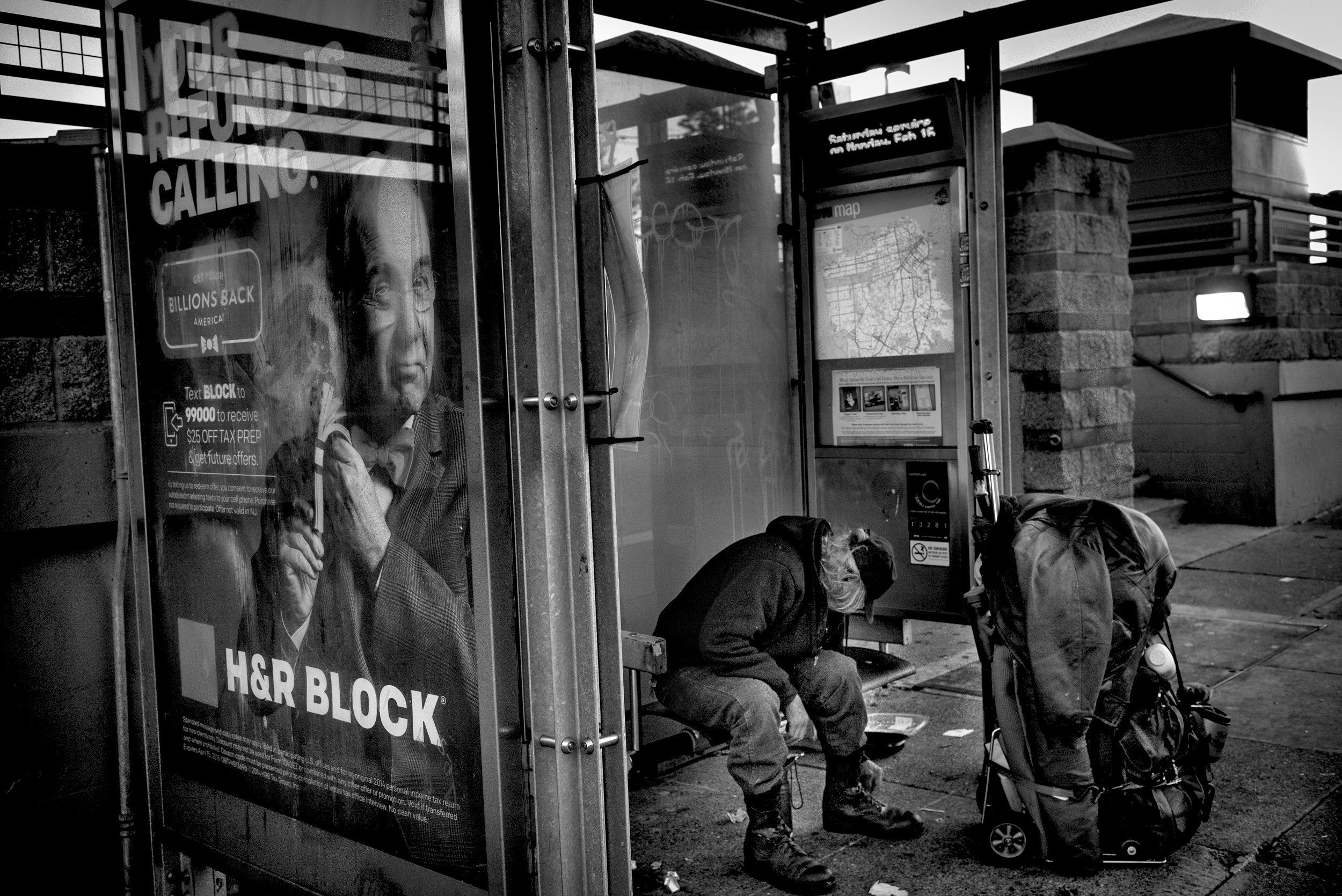
Bus shelter tax return ad says “Get you Billions Back America” while a unhoused man takes a moment to rest before moving on. 16th and Bryant Street. 12 February 2015.

Sign left on the ground at Utah Street near Division. 14 November 2015.

Jamie Crisco’s personal space in the "Bat Cave", under the foundation of a hardware store and along the commuter rail tracks where he lived with several others.. The building was sold and torn down for market rate apartments. Jamie, as of 2020, had found permeant housing after 8.5 years of living in tents, boxes, and hidden holes. 18 March 2016.
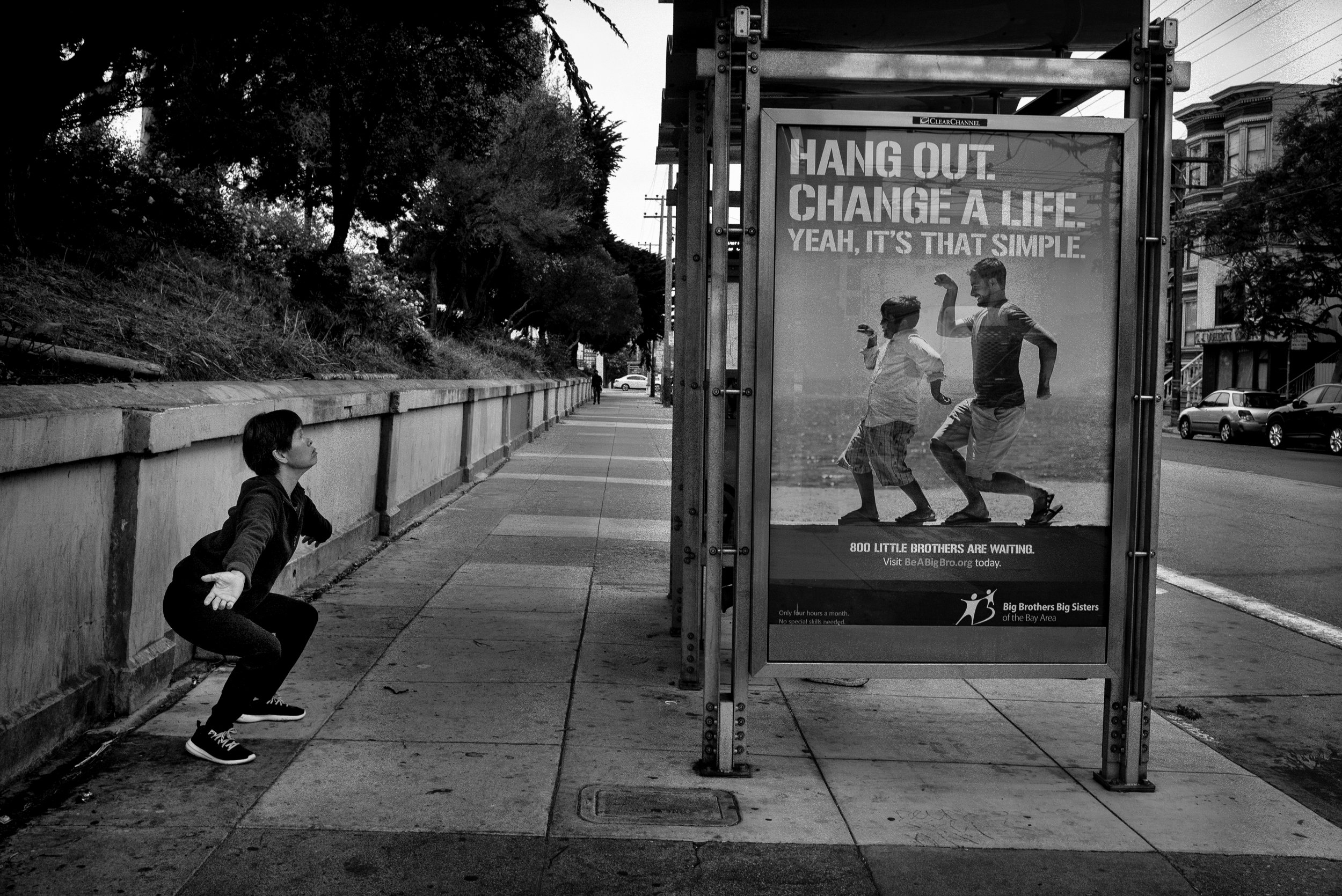
Bus shelter tax return ad says “Get you Billions Back America” while a unhoused man takes a moment to rest before moving on. 16th and Bryant Street. 12 February 2015.

Man sits with his morning coffee at the Ferry Building Saturday Farmer’s Market. 24 Sept 2016.

The view from a MUNI trolley of morning rush hour traffic on Market Street at 6th as tech workers head to work. 22 August 2017.
Tap/hover over image for caption…

Name: Lakrisha Harper, 38
Without a home: 5 years
Place: A parking lot on Merlin, under the freeway
Date: 23 April 2021
“(The most difficult thing about being out here?) Maintaining. That’s what it is. It’s hard out here, like as far as showers and food and, security.”
“(Living as a single woman you) got to be self-sufficient and take care of myself, nobody else to do it for me. We’re kind a like segregated down here. We got people at one end and thenthere’s people at the opposite end, we kind a stay to ourselves.”
“(I miss being with my kids.) Yeah, it sucks. Once I get my housing back my kids will be home but it’s hard. Stuff is like irritating. COVID hit and then everything just came to a halt. So now I got to wait.”
“(Help from the city?) No, not really, not at all. They leave us here to fend for ourselves with no resources at all. The only time we do get resources is when we raise hell and cause problems for them.”

Name: Jula Perez, 42; James Jeffrey Perez Brown, 5 mths; Elijah Perez Brown, 2
Without a home: A long time
Place: Compass Family Services
Date: 18 December 2019
How long without a home? “You know I don’t know. It’s been going on for a long time. That’s a complicated question. I was in the shelter a couple weeks, at the moment I’m in a transitional situation. Right now my apartment has mold in it and it’s not good for the babies. I’m dealing with the issues with my landlord but it’s not safe for them so I’m kind of like surfing couches. You think the situation’s fixed, and they’re just patching over the leaks, but there’s mold in the walls. With the babies that’s the hardest. I can’t get emotional because this little guy sees and hears everything. My disposition is very important to his behavior so I try to keep a straight face as much as I can.”
“Hardest thing is having children. Having to explain to my son certain things, why we have to do things especially like being in a shelter they make you leave at a certain point, the light being on, the sounds … The hardest part is not being comfortable - is not having a place of comfort. It’s very dehumanizing. There’s a stigmatizing to it, especially in this city where people are walking over people lying on the street as they’re on their iPhones. One thing I say to my older son, if someone is just lying in the street you make sure that they’re OK. Here I think that’s kind of forgotten. You walk over people, you don’t know if they’re dead, but you don’t care. You don’t even see them; you have like these blockers on. It’s like that dehumanizing thing (but) we’re all the same. If I was lying on the ground, I would hope somebody would check to see if I’m OK.”
“It’s very difficult because the shelters put you out at a certain time, you have to be in by 5 and out by 7, depending on the day. But when I have children they need a nap, it’s very difficult to find respite on the street.”
“We’re all human, we all go through rough times. I tell my son the world is your home. Not these little boxes, these four walls. For me anywhere I’m at is my home. This is our birthright. This is our inheritance and we all share it. There is no way any of us should be without, with as many resources as we have. The unequal distribution of it has gotten out of control.”

Name: Ashanti Jones, 44
Without a home: “I’ve been on the streets all my life”
Place: Parking lot between Merlin and Oak Grove
Date: 29 April 2021
Ashanti, a musician/artist, has been on the lot for 6 months but will have to move by 17 May. He doesn’t know where.
(The hardest thing is) “the harassment, social indifference. The way that people, the authorities, address you. They act like it’s my fault. I’m pretty sure, myself and a lot of these people, if the resources were available, we would take them. (But )not no hotel room for a couple months and then kick us back out on the street to do this whole recycle thing again because it generates currency. They’re getting paid off peoples’ misery.
“They moved us out of this alley and told us to pack up, that they were sending out resources. That they were going to put us in hotel rooms. We packed well into the night and no one came, and so I said let’s go in this parking lot. People still park their cars here; we don’t allow peoples’ cars to get broken into. People call the cops on us because they feel some type of social righteousness, that we’re doing something wrong. If social indifference continues to happen, they’re going to feel they can do whatever they want to us and not have to worry about any type of repercussions. I don’t understand how that’s right. If you’re moving us off the streets then that means that San Francisco has an obligation to house its citizens, and not just place them in hotels, rundown hotels. These are the homeless people that they take off the streets from a bad situation and put them into a worser one. It’s all designed so that you can be kicked out. San Francisco, they’re not addressing the homeless crisis that’s happening out here in the wealthiest city in the United States of America, and I don’t understand what’s going on. They’re moving (us) and they’re using fear of incarceration to intimidate because people are on parole and that’s not right. You’re taking a hopeless person in a desperate situations; you’re provoking them to have some sort of negative episode. It’s going to drive people insane. What do they think going to happen? Now you provoke this situation and everybody’s watching. Not just Americans but other people in other countries are watching America, “home of the brave land of the free”. It don’t feel very free, don’t feel very free at all.
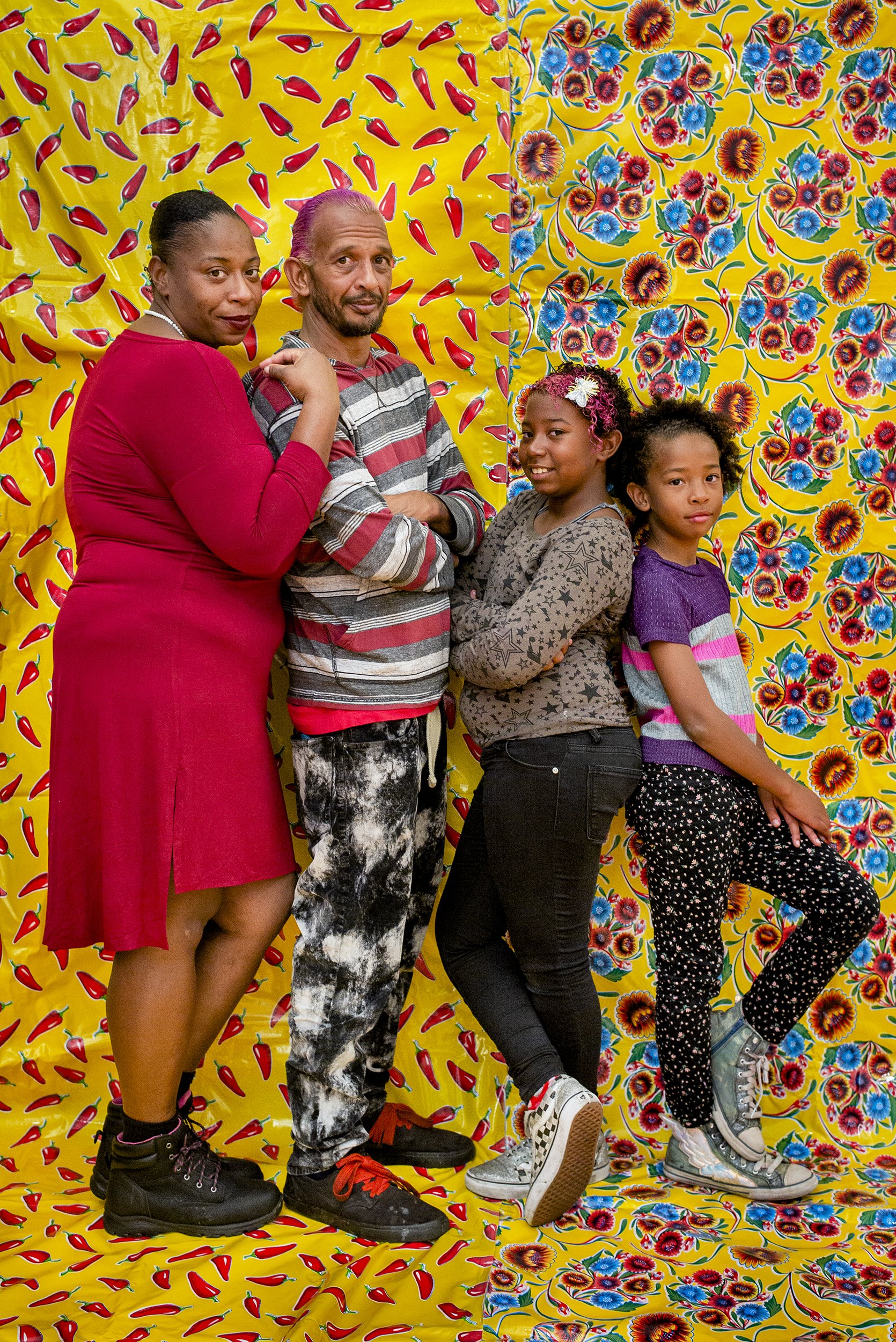
Name: Dynasty Toney, 36; JR, 45; Baltimore, 10; and Divine, 8
Without a home: About 5 years
Date: 21 October 2019
Place: Compass Family Services
What’s your typical day like?
Destiny: “A typical day would be we wakeup in the morning, like 6 in the morning, from the shelter. We get the girls ready for school. We have business for about 3 hour, and then we go relax before I have to go to work, ‘cause I work from 3 to 11.”
JR: Like she said, wake up, get our daughters ready for school. Take them to school as a family and then whatever business we have throughout the day; whether it’s coming to a Compass meeting, or a housing workshop, or looking at an apartment ‘tell about 1 o’clock. Then she’s gets ready for work, she goes to work, I pickup the girls from school and go back to the shelter around 7. But then we have to wake up at 11 and go pickup mom from work, so I have to get the girls up and rustle them to the car, go pickup mom, and then come back to the shelter. If we had a place they are almost at the age that we could leave them and I could run and pickup mom and they’d be OK for 30 minutes. But you couldn’t do that at the shelter.”
Destiny: “You do have to worry about your (shelter) slot being taken although since we’ve been there, which hasn’t been that long, we haven’t run into that problem just yet. But it is something we got to keep in mind because some nights they are full and it’s scary.”
JR: “We’re kind of fortunate because we have two vehicles. One of them we use as storage and that’s pretty much where all our stuff is. We just have a bag of cloths for the girls to get dressed and go to school with, and a bag of dirty laundry.”
Would life be much easier if you had a place?
Destiny: “Yes. In so many ways. I feel like I would be fulfilling my obligation as a mother to my daughters. We would have a place to cook, to feel clean, take a shower, a bath. The girls could have some friends over. We can do things together; play games. From there we would be able to get them more involved in things they want to do. One of them wants to do some kind of dancing or soccer, and things just go on from there. We would start living life normally. I’ll be able to cook for my family. The girls could have a party for their birthday. I would have a place to call home, somewhere to work from so that we can better our lives from there.”
JR: “It’d be easier because I wouldn’t have to worry about where the girls are going to shower everyday. I’m kind of protective like that so I wouldn’t have to worry about the bathrooms situation because they got to get up at night in the shelter to go to the bathroom. I’d like them to have their own doors to close, you know.”

Name: Tony Ballew-Ruiz, 41
Without a home: 7 years
Date: 23 June 2021
Place: Florida Street near Division
”I don’t mind the fights as much as being woken-up by a cop and then having my name ran for warrants. If I was inside a house that would never happen. I could have a warrant for ten years and nobody would ever know. That warrant could be just for missing a court date, but if I’m on the streets I’m always talking to a cop. We’re getting cops called on us all the time. We’re in other people’s space. They don’t understand that we don’t want to be in their way, we’re just looking for a space to exist. We’re just looking for a place to be. We try and find these spots that are out of the way, try and find areas that people don’t frequent.”

Name: Peter Marshall Qualls, 47
Without a home: “I’ve been without a place since I was ten and half years old”
Date: 10 February 2019
Place: San Bruno Avenue between 15th and Alameda
“Home means a place where people come together and work in partnership to share their experiences and hopes with other people in the community so that financial brackets that each of them are a part of don’t over burden them or cause people to be extremely poor. So, we share time together and trust one another and in turn give each other security and hope.”

Name: Sally Conn, 36; Jeremiah Conn, 41; Dawson Conn, 2
Date: 13 December 2018
Place: Compass
Without a home: 3 months
What does home mean?
Sally: It makes me cry. Home means to me a family, where we’re together and don’t have to move around all the time. Home is the place where me, my husband, my baby can relax, be together, have dinner together.
Jeremiah: To be honest with you shelter and home, as long as your family is together that is home. Wherever you lay your head down, that is home to me as long as our family is together.
The hardest thing
Jeremiah: Being on the streets and seeing what’s going on in real life and having my son susceptible to that every day. Him growing up around it instead of being in home where we can teach him, we can’t teach him outside.
Sally: Hardest thing is being outside all the time where the baby sees all this bad (stuff) that happens outside and you know you’re not able to go somewhere where you know you’re safe, where your baby won’t get hurt.
Jeremiah: I see how other families are having to struggle to and it does affect me because I see what is going on compared to people that have homes and have everything they need. They don’t see what we (those without a place) have to struggle and go through.
Sally: I see a lot of good people but I see more bad people. I see how they treat each other. When I came here, I thought it would be a good place for us but it’s not. It’s not a really good place and it’s affected me a lot.

Name: Alexia Castaneda, 21 and Oliver Cienfuegos, 1 ½ years
Without a home: 6 months sleeping mostly on the street
Date: 5 June 2019
Place: Compass
“At first when I lost my house I literally was just sleeping on the street in front of libraries. I finally got hotel vouchers for two weeks so at least I had somewhere to go. During that process you have to look for permanent rentals. Obviously, I couldn’t get one, especially with no job or childcare, so I ended up back on the street. After receiving welfare, I use that on emergency nights when it’s stormy, or we’re sick and I’ll get a hostel in the Tenderloin for the night, thirty bucks, fifty bucks, but that’s better than what could potentially happen.”
“(On the street it’s) me, my stroller, my blanket, and that’s it. I get really scared that people will see us, especially me with a stroller and a baby and call the police and try and have my son taken from me. I always make sure to be in a place that’s very hidden at night. There have been times where (an area) a lot of the homes can’t see underneath in the doorway because they have a little roof so when it’s raining, I get in the corner, they can’t see me, they don’t know I’m there, and it’s just for the night. I’m gone before anyone wakes up.”
“A really hard thing about being the street is not having a frig or having a way of heating up your food. You actually, get driven crazy by not eating hot meals; everything is room temperature or cold. When you’re trying to make your food stretch and you can reheat it and you can’t refrigerate it, it grows bacteria, and you get sick.”
“Secretly the hardest thing is boredom. When you’re in the mood to just go home and turn on your TV and relax, you can’t. You’re on the street, bored, and people watching. It’s hard when everywhere you walk there’s always houses. And when people come home, you see them watching TV and you’re like, “Man I really miss that”.”
“It’s really hard. I didn’t think I could grow up this much in 6 months. Even when I was pregnant with him, and like wow I’m going to be a parent, I did not grow as fast as I did when we ended up on the street. I just turned 21 but I feel 31.”

Name: Mr. Greg Smith, 67
Without a home: 5 years in his truck and paying for parking
Place: A parking lot on Merlin Street, San Francisco
Date: 23 April 2021
(I’ve been here) all together about 5 years. Like I said, I can’t afford a (house), I would have to win the Power Ball to be able to afford a house here. But I have a place. l’ve always had mobile homes before. A “camper”, you know. They’ve gotten towed, a couple of them, so I’m down to this (a box truck). But I’ve always had my own place where I rent or parked. I’ve rented here (a spot in a parking lot) for about 5 years until they declared bankruptcy and gave the place (the parking lot) up. I’m just looking for another place to rent space for my vehicles, a place I could put a small trailer.”
“That’s how I live. I’d rather live this way than in an SRO and not be as happy and secure. I like to have my own place. I can come in when I want, have my stuff, don’t have to look anybody in the eye when I come in and out, you know. And be me, just like you, you know what I’m saying.“
Update: 27 April 2021: The lot is owned by Caltrans and with the bankruptcy of the original lot operator Caltrans has found a new parking lot operator and wants the lot cleared by May 18th.

Name: Robin Lee, 35
Without a home: Off and mostly on since she was 18
Date: 8 May 2021
Place: Dore Street
“I have been on the streets on and off since I was 18, more on than off so well over 10 years. I started out in Sonoma County where I grew up with my mom. We lived in a home. I choose to come outside and be a rebellious 18-year-old.”
“(Hardest thing), definitely the showers, cleanliness, having to deal with a lot of illnesses and decease, and a lot of scary elements out here. I unfortunately have endured a few of them. Thankfully I’m recovering finally, but the elements out here can take a toll. I wouldn’t say the four walls necessarily are important but cleanliness, showers, toilet, bathroom, a refrigerator, a stove, … I mean being inside’s great and everything, but we can really make it out here if we try. Having your so-called freedom, that can go two ways. It’s a Catch 22 because you are moved and told where you can and cannot lay. There are certain laws and things that you have to abide by that are different than people that have homes, that are inside don’t have to worry about: sitting on the ground and getting a ticket because of the “sit and lie law”, or invading a parking space, or having a car that’s broken down, it’s a disadvantage for us at times.”
“When I was younger, I didn’t quite see a community but as I’ve gotten older and spent more time with people in different areas of the city, I learned there’s definitely community. We support one another. It works in a lot of different ways. Each one, teach one. You give, I give. You’re sick one day and you don’t have much and I have a plethora of things, I’m going to make sure that you’re taken care of, and you’re going to reseparate that when you see another person sick. To us, as a community, it could be a stranger or it could be somebody that I know, that’s what makes a big difference. It helps bring us all together. But you have to abide by that, you can’t just take, and take, and take. It has to be an equal balance, otherwise it becomes a shit show.”
“It is very uncomfortable to have to use a restroom as a woman on the street. Also, there are predators, male or female, there are some really scary people that prey on women. There are a lot of things I don’t even want to think about so yah, as a woman, it can be very dangerous out here, but having community defiantly helps as far as being a woman and being respected. That’s another big thing, respect. A lot of times people lack respect for women who are on the street thinking there’s a woman in a tent and she’s doing speed, or she’s doing a drug, so she’s going to have sex with me. Or she’s a prostitute. I’m going to get her high and … That’s not what it’s about. Maybe at one time it could’ve been, not for me personally, but it’s not every person that you meet or see.”

Name: Anastasia Lagrone, 20; Brenda Soyos, 40; Stacy Sayos, 3
Without a home: About a month
Date: 4 September 2019
Place: Compass Family Services
Anastasia: “I’ve been in San Francisco for about 2 months now. I moved out here because I just see more opportunities for my family, more opportunities for me to grow as a person with my children.”
“The shelter system, we stay in with a group of people. Sometimes we’re in bunk beds, it depends on where we’re at. But sometimes we’re on the floors and it’s just me and my daughter on a little mat. You go in and sign in and stay there for the night and the next morning you go do your normal stuff – Some (shelters) are different. Like we’ve tried a women’s shelter but we have my boyfriend with us so we couldn’t go into it women’s shelter.”
Brenda: “It’s hard to get a place. If you’re not there at the right time then if you’re in the middle of the line then sometimes we don’t get places to stay so we end up being in the streets, at the park sleeping. We have a tent, we always have to carry our stuff everywhere – our clothing, our papers, toothbrushes, hairbrushes, our hiking stuff.
“He goes space hunting while we come here to Compass or someplace else that they send us. What we will do is get up early in the morning, we will walk, and he will pick-up the whole tent and stuff and then he will go space hunting, somewhere he knows we’re not going to be thrown, harassed for the night.
“We’re on our own, one family, that’s all we have, each other. We have each other.
Anastasia: “This is just us. This is home for us. It’s our family. We’re just trying to make out here, just being together, that’s it. We’d just rather be together, that’s home for me. That’s love, that’s home, that’s everything.”
Brenda: “We want a home. Just somewhere we can lay our head down at night, know we’re warm and safe. Now since she’s going to have a baby, we want one before then, before Christmas comes cause she’s going to be a Christmas baby.”
Anastasia: “Playing with my daughter. Playing with her, spending my time with her reading books. Trying to make her as happy as she can be, that’s it. I just want her to be happy and feel like we’re at home, that we’re not just hurting, suffering, that we’re OK.”

Name: Lester Wayne Lewis, Jr., 46.
Without a home: 5 years. Now housed.
Place: Parking lot between Merlin and Oak Grove.
Date: 29 April 2021.
“I was homeless from 2007 to 2012 and then I became housed through DAAH. I moved in there about 2012, or 2013. When I moved in there, from the very beginning it seemed as if I was targeted. The staff was very difficult to deal with, and just very unpleasant. But I stayed and I thought that maybe I needed to adjust myself. Or maybe I needed to take a step back and take a look at things further. Maybe I’m being treated fairly and I’m not giving people the benefit of the doubt. Well as a human being we’re born with certain things that tell us when something’s not right, or when something’s wrong. Bottom line is that I never felt like I was being treated right. Then slowly but surely things started to happen with the tenants. Everybody comes with psychosis issues in those buildings. Or with disabilities of some sort, myself included. What happens is administration starts to personalize things, so they target you. Next thing you know you’re getting written up more, you’re under a microscope. Then you’re being evicted for small reasons, things that only warrant a warning or disciplinary action. There is such a disconnection with the tenants and the staff that there’s no community. You know it’s supposed to be that kind of healthy community originated environment, (but) everybody is walking around in the SROs mad. Very angry and upset. While I’m there I’m not happy, I’ve been assaulted on multiple occasions and (I) asked to be moved, but I was told they don’t do that. …
The police downplay everything that happens in the SROs. It’s almost as if they don’t want to take the report, would rather settle it right there. But that doesn’t get anything done. Someone went in my building and killed my dog. Finally, I got fed up and I left. I just go and I pay my rent. Once COVID hit I just even didn’t go back to the building. I’ve just been living out here on the streets. I’m safer out here than I feel like I am in there. I go in my unit and I can feel like somebody’s been in my unit and when I discovered how they were getting in, they (managers) said they had remediated the problem. They didn’t. I’m in court with them Friday to determine some kind of settlement, if they’re going to put me out. If that’s what they are trying to do, what are they going to do for me for everything I’ve been through? You have rodent problems. You have staff issues. Discrimination issues going on in the building, I’ve had all those issues happen to me. I was sexually assaulted in the building, made a police report and they said they couldn’t do nothing about it. I filed reports with DPH asking to be moved. I went to City Hall. I went to the Department of Building and Inspection. I went to the people who investigate if people are discriminating against you. And then I went to the Rental Board. All these places failed me. Nobody could help me. There was nobody to oversee what happened to me at that SRO.”

Name: Gina C Quidilig, 39 and son Gerwin Embuido, 11
Without a home: Off and on since 2017
Date: 20 March 2020
Place: San Bruno Avenue between 15th St and Alameda, SF, CA
“Home is something that belongs to you. A place where you can be safe and have a family, where you wake-up and prepare food. Where you don’t have to move every day, which is actually like a homeland, like your origin.”
Are you worried about the COVID-19 Virus? “No because I’m in the United States of America and I know that we got the best medicine. And I know that America will search for a cure and I know that no matter what, that they are going to recruit the best doctors that they can to get cure us if we are infected.”
“Hot-teams have spoke to us. My son went to the hospital when he did have the symptoms of the virus however they did a test on him and we were discharged that same night.”
(The next few weeks) “I’m hoping to buy a tent (the one she had was stolen), we’re still going to be here, me and my son. I’m hoping that things will be better because people will be helped. I hope that our president, Donald Trump, or whoever is the sitting one, will come by. I just hope for the best.”
Gina C Quidilig and her son Gerwin Embuido are sleeping on top of concrete support for the 101 freeway. Each morning begins with 15-30 minutes of packing up what they have and moving around during the day. With the “shelter in place” order food is becoming an issue for the unhoused.